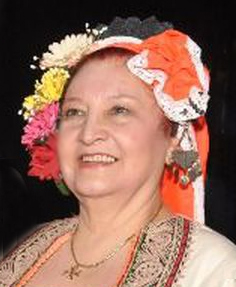The folk song is both an inspiration and a profession for Bulgarian singer Lilyana Galevska. It made her popular and filled her life with a lot of success and thrilling events. Her music career started from her native Tran area. Later she joined the Philip Koutev National Folklore Ensemble. Lilyana Galevska made a series of recordings at the Bulgarian National Radio. In the past few decades she has been part of Slavey music quartet. Lilyana sang on four continents and experienced the enthusiasm of the foreign audience. She conquered the Bulgarian and the world music stages with the songs from her native region.
 "My inspiration comes from a very famous voice in the Tran area which sounded in the small mountain village of Vrabcha- the voice of my mother Ika Stoyanova, Lilyana Galevska told Radio Bulgaria. I am very proud of my mother. She is part of the generation of folklore singers who paved the road of our music careers. My mother was the last child of my grandparents Maria and Stoyan. She did a lot for the Bulgarian folk song. My grandfather used to be a very skilled singer who also played on a mandolin. He handed down the folk songs to my mother and she later handed them down to me. I have handed them down to my daughter Ekaterina. I inherited the artistic behavior and the voice from my mother and recorded all her songs. It turned out that these songs were quite old and were handed down from one generation to another. Many young musicians also recorded my songs. “God sent me the gift to sing across the globe”- my mother used to say.
"My inspiration comes from a very famous voice in the Tran area which sounded in the small mountain village of Vrabcha- the voice of my mother Ika Stoyanova, Lilyana Galevska told Radio Bulgaria. I am very proud of my mother. She is part of the generation of folklore singers who paved the road of our music careers. My mother was the last child of my grandparents Maria and Stoyan. She did a lot for the Bulgarian folk song. My grandfather used to be a very skilled singer who also played on a mandolin. He handed down the folk songs to my mother and she later handed them down to me. I have handed them down to my daughter Ekaterina. I inherited the artistic behavior and the voice from my mother and recorded all her songs. It turned out that these songs were quite old and were handed down from one generation to another. Many young musicians also recorded my songs. “God sent me the gift to sing across the globe”- my mother used to say.
“In 1967 we toured Bulgaria with celebrated musicians such as Tsvyako Blagoev (shepherd’s flute), Ivan Shibilev (accordion), etc, Lilyana Galevska went on to say. Earlier, I spent four years at Izvorche Ensemble which was at that time part of the Pioneer Palace headed by folklorist Mihail Bukureshtliev. There, I learned how to stick flowers in my hair, how to dress in folk costumes, how to behave and sing on the stage, etc. Later, on March 5, 1968, I joined the Philip Koutev National Folklore Ensemble. One year later I became a soloist at that ensemble. We used to hold around 80 concerts per year. When I left the Philip Koutev Ensemble Bulgaria’s acclaimed singer Nadka Karadzhova invited me to join the newly-established Slavey music quartet. Currently, I am a doyen of that music formation together with Nadka Karadzhova’s daughter Svetla. The music quarter is open for young Bulgarian female singers and is named Nadka Karadzhova’s Nightingales. I remember a concert which was held at the time when I was still singing at Vanya Moneva’s choir. It was Monday. We buried my grandfather at noon and later in the evening we had to hold a concert with pieces by Krasimir Kuyrkchiyski. I had to sing nine solos and had to take part at that concert. I dedicated the concert to my father who also loved folk music. I can also talk a lot about Japan. Our quartet had eight concerts in this country and we had many happy moments there. For example we sang in front of 6,000 people in the city of Sendai and the music hall was literally bursting at the seams. The audience liked our costumes a lot and asked us how they were made. It is very exciting to see how Bulgarian music influences a foreign audience, which does not know Bulgarian at all. I remember a famous Japanese professor saying at that concert that the Bulgarian folk song was the world’s eight wonder. We also held three concerts on New Caledonia Island in the Pacific Ocean. The music halls were overcrowded at these concerts. The local newspapers wrote “When the curtain opened four icons appeared on the stage.”
English version: Kostadin Atanasov
Eight days before Easter, we celebrate Lazarus Saturday (St. Lazarus Day). It is the first of the three major Christian feasts associated with the miracle of the Resurrection and is followed by Palm Sunday and Easter. St. Lazarus Day is celebrated..
The Bulgarian village of Turia at the southern foothill of the Balkan Range is welcoming over a thousand participants in the Masquerade Games "Old Men in Turia". This year's edition of the festival on 30 March will feature 28 mummers' groups from all..
"In a vast region in northern Bulgaria, St. Todor is somehow perceived as a demonic character... He visited gatherings of unmarried girls, which were prohibited during that period; he acquired the appearance of a young bachelor, but distinguishable by..

+359 2 9336 661
